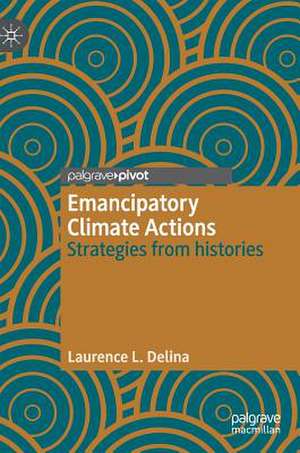Emancipatory Climate Actions: Strategies from histories
Autor Laurence L. Delinaen Limba Engleză Hardback – 16 mai 2019
Mining select histories from India, the United States, the Philippines, and Burma, the book explores topics including visioning and identity building; framing; triggering pressure; boosting publicity; and diversifying networks as strategic tools to the repertoires of climate action groups, organizations, and institutions. It will be of great value to academics and practitioners, as well asto anyone interested in how to actively combat climate change.
Preț: 384.09 lei
Nou
Puncte Express: 576
Preț estimativ în valută:
73.51€ • 75.93$ • 61.17£
73.51€ • 75.93$ • 61.17£
Carte tipărită la comandă
Livrare economică 26 martie-09 aprilie
Preluare comenzi: 021 569.72.76
Specificații
ISBN-13: 9783030173715
ISBN-10: 3030173712
Pagini: 113
Ilustrații: XIV, 124 p. 1 illus.
Dimensiuni: 148 x 210 mm
Greutate: 0.32 kg
Ediția:1st ed. 2019
Editura: Springer International Publishing
Colecția Palgrave Pivot
Locul publicării:Cham, Switzerland
ISBN-10: 3030173712
Pagini: 113
Ilustrații: XIV, 124 p. 1 illus.
Dimensiuni: 148 x 210 mm
Greutate: 0.32 kg
Ediția:1st ed. 2019
Editura: Springer International Publishing
Colecția Palgrave Pivot
Locul publicării:Cham, Switzerland
Cuprins
1 Introduction: Emancipatory and transformative climate actions.- 2 Four Histories of Social Mobilizations: Dandi, Dharasana, Montgomery, Manila, and Rangoon.- 3 Visioning and Identity-building: An overarching vision for heterogeneous campaigns.- 4 Culturing and Framing: Working on the ills of the past in the present for tomorrow’s benefits.- 5 Triggering Communal Peer Pressure: Spreading a shared understanding of demands.- 6 Boosting Publicity: Old and new media, deliberations, and organic ideology articulation.- 7 Diversifying Networks: Webbing heterogeneous actors and their plural campaigns.- 8 Conclusion: Strengthening climate actions through emancipatory and transformative mobilizations.
Notă biografică
Laurence L Delina conducts research at the Frederick S. Pardee Center for the Study of the Longer-Range Future at Boston University, USA..
Textul de pe ultima copertă
“Why does the world seem ever further from averting climate catastrophe? Past decades have seen no shortage of high-profile rhetoric. For an international treaty commitment, public and private efforts are unprecedented. Viable technical and wider social solutions abound. Yet real progress remains thwarted. In this timely and innovative book, Laurence Delina points to some key reasons why – and offers some novel and important new insights. Extending beyond the usual policy tropes, the book bursts with fresh ideas for challenging deep hegemonies and collectively ‘culturing’ the needed radical transformations. The result is an invigorating triumph of hope over despair.”
-- Andrew Stirling, Professor of Science & Technology Policy, SPRU, University of Sussex, UK.
This book calls for a collective strengthening of the progressive dimension of climate action in the face of continued myopic governmental response. Delina argues that consent must be revoked andpower realigned to avoid suffering the consequences of unabated climate change. He looks back at the mechanisms that make previous social mobilizations successful to design strategies that would advance a new hegemonic agenda. This new agenda calls for the culturing of contemporary human societies towards a hegemony characterized by just emancipations and sustainable transformations. Mining select histories from India, the United States, the Philippines, and Burma, the book explores topics including visioning and identity building; framing; triggering pressure; boosting publicity; and diversifying networks as strategic tools to the repertoires of climate action groups, organizations, and institutions. It will be of great value to academics and practitioners, as well as to anyone interested in how to actively combat climate change.
Laurence L Delina conducts research at the Frederick S. Pardee Center for the Study of the Longer-Range Future at Boston University, USA.
Caracteristici
Offers concrete strategies to strengthen contemporary climate activism Argues for the need of wide spread social mobilisation to combat climate change Explores strategies from previous social movements
